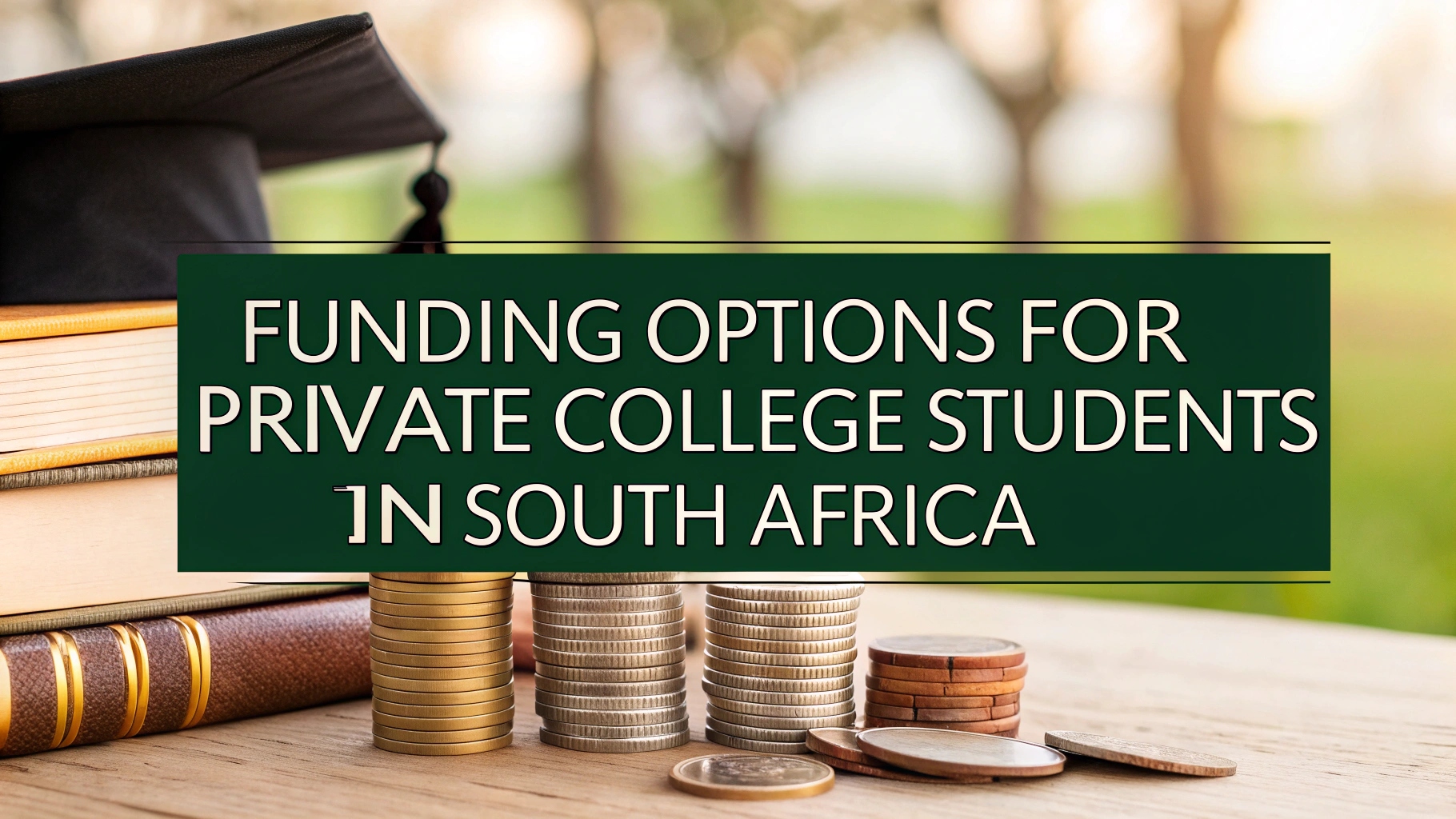Funding Options for Private College Students in South Africa

Private colleges in South Africa offer flexible, industry-aligned programs that cater to a wide range of careers—from business to beauty, IT to hospitality, and beyond. While these institutions often offer smaller class sizes and practical learning environments, one of the biggest challenges many students face is the cost of tuition.
Unlike public universities and TVET colleges, many private colleges in South Africa do not qualify for NSFAS funding, which is the primary source of financial aid for many students. This makes it crucial for students and parents to explore alternative funding options to make higher education at private colleges more accessible.
In this post, we’ll explore a variety of funding options for private college students in South Africa, including bursaries, loans, hipsplans, and employer sponsorships.
1. Private College Bursaries
Many private colleges in South Africa offer internal bursaries or discounts to help students with financial need or academic merit.
Types of Bursaries Offered by Private Colleges:
-
Academic Excellence Bursaries – awarded to students with strong academic performance.
-
Financial Need Bursaries – for students who demonstrate financial hardship.
-
Sport or Talent-Based Bursaries – for achievements in sport, arts, or leadership.
-
Sibling Discounts – for families with more than one child studying at the institution.
Examples of Private Colleges Offering Bursaries:
-
Boston City Campus
-
Vega School
-
ICESA Education
-
Rosebank College
-
Damelin
📌 Tip: Visit the official website of your chosen college and search for the “financial aid” or “bursary” section. Each college has its own criteria and application process.
2. Student Loans from Banks and Financial Institutions
Several South African banks and financial institutions offer student loans that can be used to fund private college studies. These loans usually cover tuition, textbooks, registration fees, and sometimes accommodation.
Major Banks Offering Student Loans:
-
Standard Bank Student Loans
-
ABSA Study Loans
-
FNB Student Loans
-
Nedbank Student Loans
What You’ll Need to Apply:
-
Proof of registration at a recognised private college
-
South African ID
-
Guarantor or surety (usually a parent or guardian with income)
-
Recent payslips or proof of income (for the surety)
Interest rates vary depending on your credit history and repayment plan. Most loans require interest-only payments during the course of study, with full repayments starting once the student has graduated.
3. Scholarships and External Bursaries
There are several private organisations, NGOs, and foundations in South Africa that offer scholarships or bursaries to students attending both public and private institutions.
Examples of Organisations Offering Bursaries:
-
The Funza Lushaka Bursary Programme (only for teaching, not available for private colleges)
-
The South African Institute of Chartered Accountants (SAICA)
-
The Allan Gray Orbis Foundation
-
Sasol Bursary Programme
-
Shoprite Bursaries
-
The National Youth Development Agency (NYDA)
While not all external bursaries apply to private college students, some do—especially if the private college is accredited and registered with the Department of Higher Education and Training (DHET).
📌 Tip: Use platforms like www.bursaries-southafrica.co.za, Career Wise, and EduFunding to search for applicable scholarships.
4. Interest-Free Payment Plans
Most private colleges offer payment plan options that allow students to pay their tuition in monthly instalments over the academic year instead of one lump sum.
Benefits of Payment Plans:
-
No interest in most cases
-
Easier to manage cash flow
-
Available to most students without needing a credit check
Example:
At a college like Rosebank College, tuition fees can be paid:
-
Annually (with a discount)
-
Per semester
-
Monthly (e.g., over 10 or 12 months)
📌 Tip: When registering at a college, ask if they offer “flexible payment options” or “monthly debit orders.” Always get a written copy of the agreement.
5. Family or Guardian Sponsorship
Many students rely on parents, guardians, or extended family members to sponsor their studies. If you go this route, it’s important to:
-
Be clear about tuition costs and other expenses
-
Provide proof of registration and an official fee structure from the college
-
Discuss and agree on a written plan to avoid misunderstandings
In some cases, family members may combine resources to assist a deserving student. Parents with access to personal loans or revolving credit may also help fund studies while managing repayment over time.
6. Employer or Company Sponsorships
If you’re already employed (especially part-time or full-time in a relevant industry), you can explore the option of employer-sponsored education.
How It Works:
-
Your employer pays a portion or all of your study fees
-
You may need to commit to working with them for a certain period after graduation
-
This is common in fields like IT, health, accounting, or engineering
Some companies also have learnerships or bursaries for staff development.
📌 Tip: Speak to your HR department about study assistance or bursary schemes offered by your workplace.
7. Learnerships and Skills Programs
Some private colleges work in partnership with SETAs (Sector Education and Training Authorities) to offer learnerships, where students can “earn while they learn.”
These programs often include:
-
A stipend or salary while studying
-
Fully funded tuition
-
Workplace training and industry exposure
Key SETAs to Explore:
-
MICT SETA (for IT and media)
-
ETDP SETA (for education and training)
-
HWSETA (for health and social development)
Visit www.skillsportal.co.za to see current learnerships available for private college students.
Final Thoughts
While private colleges in South Africa may not qualify for NSFAS funding, there are still plenty of funding options available to help you afford quality education. From internal bursaries and bank loans to payment plans, employer sponsorships, and learnerships, students have multiple paths to access financial support.
The key is to start early—research funding opportunities at least 6–12 months before your studies begin. Gather your documents, write a strong motivation letter, and apply to as many bursaries or scholarships as possible. Also, don’t be afraid to talk to your college’s financial aid office for help.